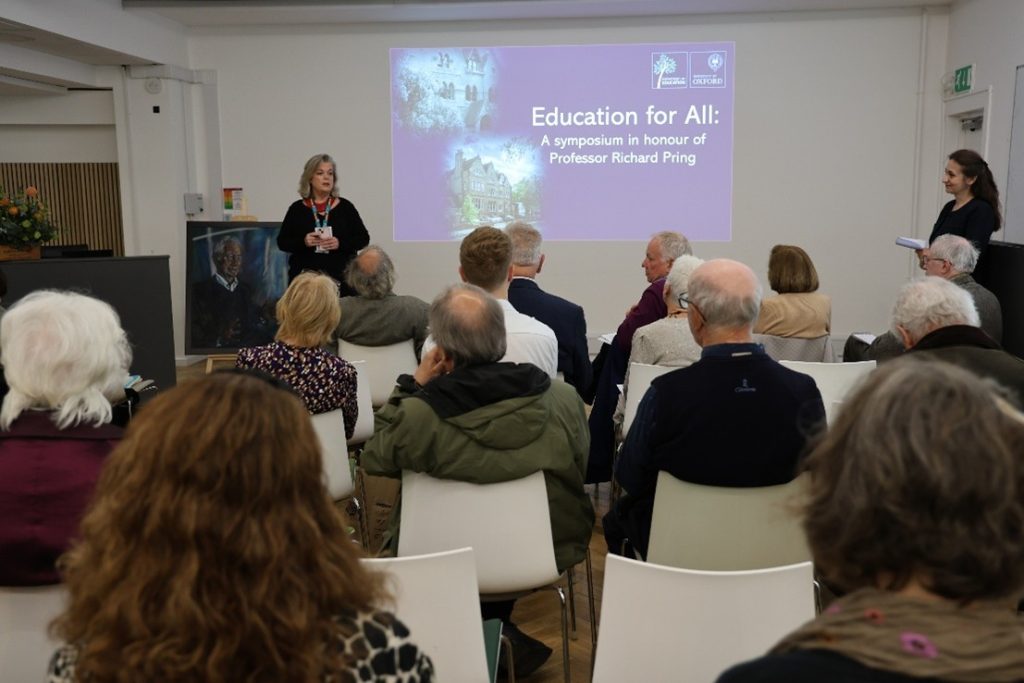The Department of Education has achieved its highest annual research income to date, with records also showing an 82% increase in the total amount of research funding since 2016. This news comes just ahead of its 100th anniversary year.
The department’s current research portfolio comprises over 80 active projects, with research taking place across six of the world’s continents. During 2017/18 funding was received from EU Government and Industry, Research Councils, UK Charity, Industry and the Public sectors. Some key funders included the European Commission, Economic & Social Research Council, Nuffield Foundation, Wellcome Trust, Education Endowment Fund and the Departments of Health and Social Care, Children Schools & Families, Education and Education & Skills.
Research in the department addresses a wide range of education matters across the lifespan, from the early years, through schooling, further and higher education and into the workplace. Projects awarded during this period have spanned educational themes addressing language, cognition and development, policy, economy and society, and pedagogy, learning and knowledge. Some areas of particular focus have included research to address equality and social disadvantage in education, children’s emotional, social, mental health and well-being, as well as advancements in digital learning and assessment. Below are a selection of some of our current research projects.
With millions of children around the world using digital learning technologies claiming to have developmental significance, a grant received during the 2017/18 period has allowed the department to coordinate a rigorous programme of research to examine key issues in learning through digital technologies so to better understand and improve the process for children and their learning at critical points in their lives. www.education.ox.ac.uk/research/lift-learning-for-families-through-technology/
Children who enter school with poorly developed language are also at high risk of educational failure and it is imperative that they receive intervention before they fail to learn. Research funded by the Nuffield Foundation has allowed the department to develop a preschool language programme for use in nurseries to ameliorate the language weaknesses seen in disadvantaged groups at school entry, whilst also reducing the inequalities in educational attainment associated with social disadvantage. www.education.ox.ac.uk/research/the-nuffield-nursery-language-programme/
A two year collaborative project funded by the European Union’s Horizon 2020 programme will also see departmental researchers contribute to an initiative to combat inequalities and increase inclusiveness in education systems and society across 11 countries. The project includes 17 partners who will aim to contribute to effective policy and practice development at different system levels in order to effectively combat early arising and persisting educational inequalities.
www.education.ox.ac.uk/research/isotis-inclusive-education-and-social-support-to-tackle-inequalities-in-society/
Starting in February 2018, a new five year research programme has begun to increase the understanding of the role of attachment and trauma in children’s education by facilitating staff development on attachment and trauma in a minimum of 300 schools nationally. The programme is taking place across primary, secondary and special schools across England. The expectation, to demonstrate that schools being ‘attachment aware’ and addressing these needs early will lead to improved quality of relationships and the experience of all children and young people in school and make a difference to young people’s emotional, social, mental health and well-being.
Memory is the ability to remember and manipulate information over short-time frames. With proven studies showing a correlation between working memory and attainment in maths, particularly arithmetic, the Education Endowment Foundation granted the department research funds to utilise a working memory intervention that would improve children’s working memory in deaf and hearing children in the UK, targeting those who have been identified by teachers as performing in the bottom third of the class for numeracy at the end of Key Stage 1. This will see the intervention utilised in over 120 national schools by training teaching assistants to deliver the programme.
www.education.ox.ac.uk/research/improving-childrens-working-memory/
Children’s Centres are a much valued resource for parents expecting a baby, or those with a child under 5 years old, providing a place, or group of places, where local families with young children can go and enjoy facilities and receive support that they need. Research funded by the Sutton Trust has allowed the department to survey local authorities in England and investigate closure and change in centre provision. The research discovered that closures in England were double that of the official government figures. The final report was sent to Leila Moran MP (LibDem Education lead), accompanied by five top recommendations for the future.
www.education.ox.ac.uk/research/stop-start-a-review-of-childrens-centres-in-england/
Young people Not in Employment, Education or Training (NEETs), is a term that was first used in the UK but has since spread to other countries and regions. In 2012 no less than 15% of young people aged 15-29 in Organisation for Economic Co-operation and Development (OECD) countries were Not in Employment, Education or Training. It is known that NEET rates vary markedly between countries – in Turkey, for example, almost 30% of all young people were NEETs in 2012, whilst in the Netherlands the NEET rate was 7% – the lowest of all the countries. Funding received by the Economic and Social Research Council has allowed the department to explore and understand the similarities and differences in NEETs across several OECD countries to identify patterns, causes and consequences in France, Germany, Japan, the Netherlands and the UK.
www.education.ox.ac.uk/research/understanding-neets-individual-and-institutional-determinants-of-youth-inactivity-in-france-germany-japan-the-netherlands-and-the-uk/
An international survey commissioned by the Department for Education exploring the use of teaching and learning research to inform and improve teaching practice by looking directly into the classroom and capturing insights and observations on an international scale. The department has provided the academic and technical input for the design of the English component of the video study pilot, and is contributing to the resulting analysis and insights for relevant policy makers.
www.education.ox.ac.uk/research/talis-video-study/
The Department of Education is renowned for its research excellence and was ranked first in the UK in the most recent research evaluation exercise (the REF). The department has nine research groups and four research centres specialising in Applied Linguistics, English Medium Instruction, Child Development and Learning, Foster Care and Education, Educational Assessment, Comparative and International Education, Skills Knowledge and Organisational Performance, Higher Education, Philosophy and Religion, Learning and New Technologies, Pedagogy, Sociocultural and Activity Theory and Teacher Education and Professional Learning.
In 2019, the department will celebrate its 100th year leading research in education. This milestone acknowledging the official passing of a statute creating the Oxford University Department of Education, known in 1919 as ‘The University Department for the Training of Teachers’. A year-long series of themed activities will be delivered to celebrate, starting with a Public Seminar Series to address ‘Student Access to University’. If you have an interest in the future of education and would like to be kept informed about our anniversary activities, join our mailing list to receive the top news, publications and event opportunities for the forthcoming year and beyond.
To find out more about the Public Seminar Series on ‘Student Access to University’, visit: www.education.ox.ac.uk/public-seminar-series-on-student-access-at-the-university-of-oxford-announced/
To learn more about our breadth of research and view all active projects, see:www.education.ox.ac.uk/our-research/projects/










